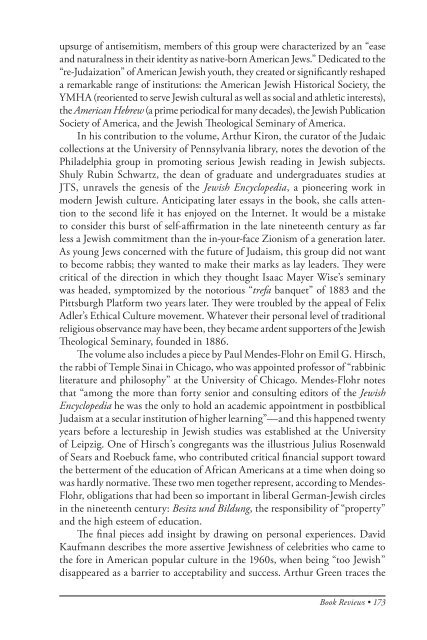American Jewish Archives Journal, Volume 64, Numbers 1 & 2
American Jewish Archives Journal, Volume 64, Numbers 1 & 2
American Jewish Archives Journal, Volume 64, Numbers 1 & 2
Create successful ePaper yourself
Turn your PDF publications into a flip-book with our unique Google optimized e-Paper software.
upsurge of antisemitism, members of this group were characterized by an “ease<br />
and naturalness in their identity as native-born <strong>American</strong> Jews.” Dedicated to the<br />
“re-Judaization” of <strong>American</strong> <strong>Jewish</strong> youth, they created or significantly reshaped<br />
a remarkable range of institutions: the <strong>American</strong> <strong>Jewish</strong> Historical Society, the<br />
YMHA (reoriented to serve <strong>Jewish</strong> cultural as well as social and athletic interests),<br />
the <strong>American</strong> Hebrew (a prime periodical for many decades), the <strong>Jewish</strong> Publication<br />
Society of America, and the <strong>Jewish</strong> Theological Seminary of America.<br />
In his contribution to the volume, Arthur Kiron, the curator of the Judaic<br />
collections at the University of Pennsylvania library, notes the devotion of the<br />
Philadelphia group in promoting serious <strong>Jewish</strong> reading in <strong>Jewish</strong> subjects.<br />
Shuly Rubin Schwartz, the dean of graduate and undergraduates studies at<br />
JTS, unravels the genesis of the <strong>Jewish</strong> Encyclopedia, a pioneering work in<br />
modern <strong>Jewish</strong> culture. Anticipating later essays in the book, she calls attention<br />
to the second life it has enjoyed on the Internet. It would be a mistake<br />
to consider this burst of self-affirmation in the late nineteenth century as far<br />
less a <strong>Jewish</strong> commitment than the in-your-face Zionism of a generation later.<br />
As young Jews concerned with the future of Judaism, this group did not want<br />
to become rabbis; they wanted to make their marks as lay leaders. They were<br />
critical of the direction in which they thought Isaac Mayer Wise’s seminary<br />
was headed, symptomized by the notorious “trefa banquet” of 1883 and the<br />
Pittsburgh Platform two years later. They were troubled by the appeal of Felix<br />
Adler’s Ethical Culture movement. Whatever their personal level of traditional<br />
religious observance may have been, they became ardent supporters of the <strong>Jewish</strong><br />
Theological Seminary, founded in 1886.<br />
The volume also includes a piece by Paul Mendes-Flohr on Emil G. Hirsch,<br />
the rabbi of Temple Sinai in Chicago, who was appointed professor of “rabbinic<br />
literature and philosophy” at the University of Chicago. Mendes-Flohr notes<br />
that “among the more than forty senior and consulting editors of the <strong>Jewish</strong><br />
Encyclopedia he was the only to hold an academic appointment in postbiblical<br />
Judaism at a secular institution of higher learning”—and this happened twenty<br />
years before a lectureship in <strong>Jewish</strong> studies was established at the University<br />
of Leipzig. One of Hirsch’s congregants was the illustrious Julius Rosenwald<br />
of Sears and Roebuck fame, who contributed critical financial support toward<br />
the betterment of the education of African <strong>American</strong>s at a time when doing so<br />
was hardly normative. These two men together represent, according to Mendes-<br />
Flohr, obligations that had been so important in liberal German-<strong>Jewish</strong> circles<br />
in the nineteenth century: Besitz und Bildung, the responsibility of “property”<br />
and the high esteem of education.<br />
The final pieces add insight by drawing on personal experiences. David<br />
Kaufmann describes the more assertive <strong>Jewish</strong>ness of celebrities who came to<br />
the fore in <strong>American</strong> popular culture in the 1960s, when being “too <strong>Jewish</strong>”<br />
disappeared as a barrier to acceptability and success. Arthur Green traces the<br />
Book Reviews • 173
















